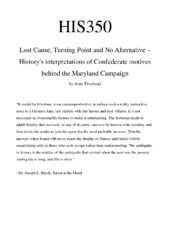Lost Cause, Turning Point and No Alternative - History's interpretations of Confederate motives behind the Maryland Campaign
Abstract
"How has history's understanding of the Confederate motives for invading Maryland in September 1862 developed from the earliest works on the topic to the present day?" The Confederate invasion of Maryland, usually called "the Maryland Campaign", was an offensive undertaken by the Confederate Army of Northern Virginia which lasted from September 4th to the night of September 18th/19th, 1862. It is historically significant for a number of reasons. It represented the first large-scale penetration of the North by a Southern army in the Eastern theater of the war (the term "North" here meaning the territory of a state which was not in rebellion against the Union). It culminated in one of the bloodiest battles of the war, the Battle of Antietam, which remains the bloodiest single day in American history, as far as American casualties are concerned - a close-fought battle which could have spelled disaster for the Confederates if they had lost. And perhaps most importantly, the campaign and its aftermath had great political consequences that would in some ways change the nature of the war. They would set the stage for the abolition of slavery and remove whatever chance the South had of achieving diplomatic recognition - and possible aid in the war - by the nations of Europe. The question of the South's motives for entering Maryland, then, is not an insignificant one when it comes to understanding the nature of the war itself. It is, however, primarily the historiography around this event which the thesis aims to examine. There seems to have been two dominant perspectives or schools of thought in Civil War history through whose lenses the Maryland Campaign has been viewed, these being the "Lost Cause" perspective and the "Historical Contingency" perspective. Through two chapters, one exploring older texts, the second more recent ones, this texts aim to explore what various authors have to say on the topic of the Confederate decision to invade, and how their opinions do (or do not) conform to these two broader perpectives or schools of thought. In doing so, it will also look into how these perspectives relate to each other historically, what may have caused the original near-total dominance of the Lost Cause perspective to give way to the birth and growth of the Historical Contingency perspective, and what this development meant for Maryland Campaign historiography. It will further investigate a subject matter inherent to the research question which neither of the two perspectives seem to answer in a satisfactory manner, which is: "What were the alternatives to invasion?" This question will be addressed in a chapter of its own. Finally, the thesis will take a brief look at how the decision to invade has been presented in a few selected works of popular media and historical fiction.
